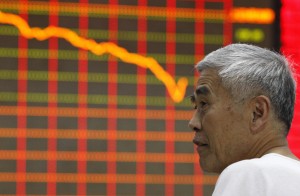Asian shares fall on Fed plan, credit fears hit China

A stock investor watches a board displaying stock prices at a brokerage house in Huaibei in central China’s Anhui province Monday June 24, 2013. Asian markets tumbled Monday, extending last week’s falls after the US Federal Reserve indicated it could reel in its stimulus later in the year, while Hong Kong and Shanghai were stung by a liquidity crisis in China. AP PHOTO
HONG KONG—Asian markets tumbled Monday, extending last week’s falls after the US Federal Reserve indicated it could reel in its stimulus later in the year, while Hong Kong and Shanghai were stung by a liquidity crisis in China.
However, the Fed’s announcement that it could soon start winding down its bond-buying continued to provide support to the dollar, pushing it back towards 100 yen.
Shanghai slumped 5.30 percent, or 109.86 points, to 1,963.24—below the psychological 2,000-point level analysts had pegged as support. Hong Kong lost 2.22 percent, or 449.33 points, to end at 19,813.98.
Tokyo closed down 1.26 percent, or 167.35 points, at 13,062.78. The losses reversed a 1.42 percent gain at the start of Monday’s session that had been stoked by a solid victory for Prime Minister Shinzo Abe’s ruling coalition in elections ahead of national upper house polls next month.
In Sydney, where a number of listed firms rely heavily on trade with China, the market closed down 1.47 percent, or 69.7 points, at 4,669.1, while Seoul skidded 1.31 percent, or 23.82 points, to 1,799.01.
Article continues after this advertisementChinese investors have been sent running by a liquidity crisis in the banking system, which has caused lenders to put the brakes on loans.
Article continues after this advertisementThe rates banks charge to borrow from each other has surged in the past two weeks but the People’s Bank of China has refrained from injecting more cash—owing to fears about a growth of bad debt—which has in turn weighed on the economy.
Hopes that Beijing would step in to provide money were dashed at the weekend when a commentary by the official Xinhua news agency said there was no shortage of funds in the financial system.
It blamed speculation and non-bank forms of lending, often called “shadow finance,” for the problem.
“It’s not that there’s no money, it’s that the money is not in the right places,” the commentary said.
Wu Bangdong, analyst at Changjiang Securities, said: “A lack of policy stance from the central bank during the cash crunch is the main reason that stock markets keep falling, so investors are waiting eagerly for any direction cues.”
Global markets have been sent into a downward spiral since the Fed announcement last week that the economy looked in good enough shape for it to start rowing back on its $85-billion-a-month bond-buying scheme.
While the move shows the US economy is gaining strength, dealers fear it will mean there is less cash in the financial system to invest.
Tokyo’s Nikkei has been supported, however, by a strengthening of the dollar against the yen. But the index was negative Monday despite the dollar edging higher and Sunday’s poll victory for the government.
The ruling Liberal Democratic Party (LDP) and New Komeito secured solid victories in the Tokyo metropolitan assembly election.
“Voters reaffirmed confidence in ‘Abenomics’ and the ruling coalition government, which was symbolically important given the recent volatility seen in equities prices,” Hirochi Nishi, general manager of equities at SMBC Nikko Securities, told Dow Jones Newswires.
Abenomics refers to the big-spending policy put in place by Premier Abe that has been credited with a rallying stock market, weaker yen and a pick-up in economic growth.
“Leading up to the upper house elections in parliament in July, this should reassure investors that the course of present government economic policy will be maintained.”
The dollar bought 98.36 yen on Monday in Tokyo, compared with 97.87 yen in New York late Friday. The euro sat at 128.85 yen and $1.3099, against 128.45 yen and $1.3122.
In New York on Friday the Dow rose 0.28 percent, the S&P 500 added 0.27 percent and the Nasdaq fell 0.22 percent.
Oil prices slipped. New York’s main contract, West Texas Intermediate light sweet crude for delivery in August, was down 52 cents at $93.17 a barrel and Brent North Sea crude for August delivery shed 71 cents to $100.20.
Gold fetched $1,283.99 per ounce by 1030 GMT, from $1,293.33 late Friday.
In other markets:
— Singapore was down 1.60 percent, or 50.14 points, to 3,074.31.
Real estate developer Capitaland shed 2.30 percent to Sg$2.98, while DBS bank was down 1.10 percent at Sg$15.28.
— Bangkok fell 2.60 percent, or 36.41 points, to 1,364.09.
Airports of Thailand dropped 8.05 percent to 137 baht, while Charoen Pokphand Foods lost 8.02 percent to 21.80 baht.
— Jakarta ended down 1.90 percent, or 85.91 points, at 4,429.46.
Indah Kiat Pulp and Paper fell 7.76 percent to 1,070 rupiah, while food manufacturer Indofood Sukses Makmur rose 0.79 percent to 6,350 rupiah.
— Kuala Lumpur ended down 1.01 percent, or 17.66 points, to 1,738.19.
Axiata Group fell 0.2 percent to 6.60 ringgit, while Astro Malaysia Holdings gained 2.7 percent to 3.06 ringgit.
— Taipei ended down 0.45 percent, or 35.28 points, at 7758.03.
— Manila dived 3.42 percent, or 211.12 points, to 5,971.05.
Philippine Long Distance Telephone fell 1.43 percent to 2,748 pesos while Metropolitan Bank and Trust slipped 6.91 percent to 105 pesos.
— Wellington ended flat, edging up 0.98 points to 4,364.05.
Goodman Property was up 1.5 percent at NZ$1.04 and Precinct Properties added 0.5 percent to NZ$1.04. Sky Television fell 2.4 percent to NZ$4.96
— Mumbai slid 1.24 percent, or 233.35 points, at 18,540.89.
Indian drug maker Ranbaxy fell 6.85 percent to 325.5 rupees while Sterlite, the local arm of resources group Vedanta, fell 3.91 percent to 77.45 rupees.—Danny McCord